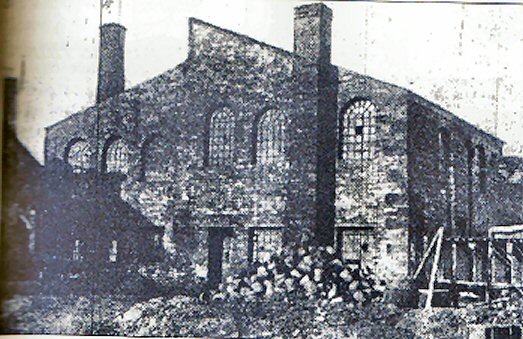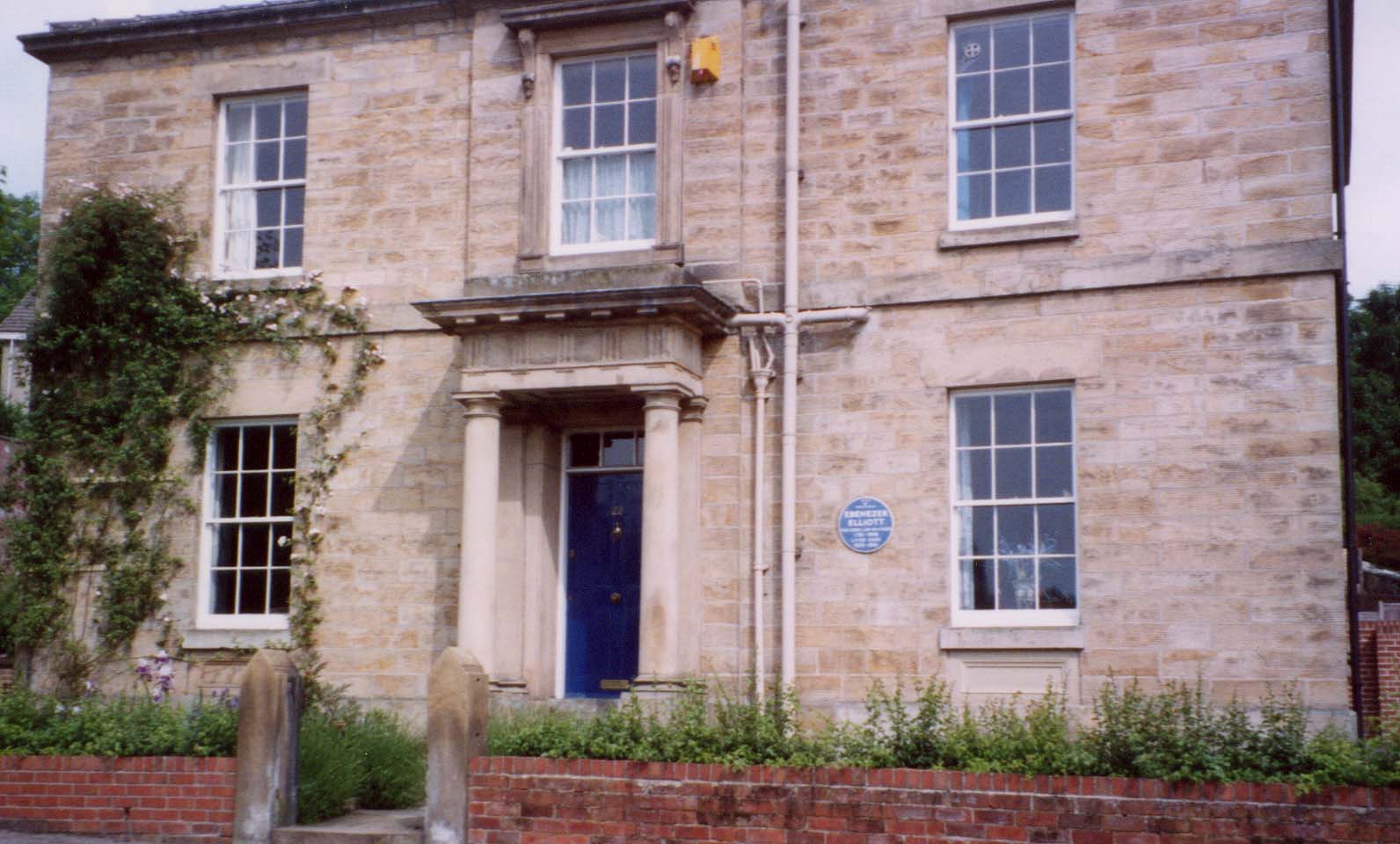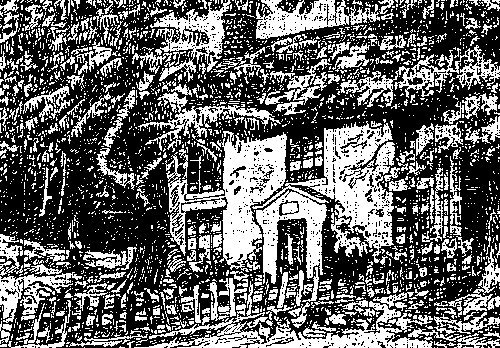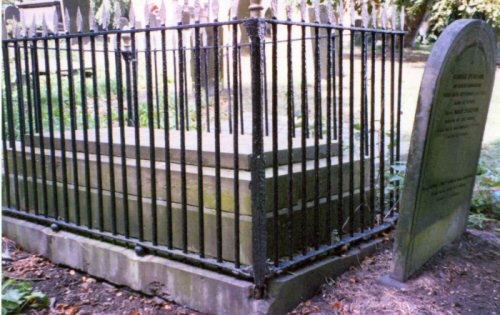

The Elliott Family Business
For the purpose of this article, it needs explaining that
there were two Ebenezer Elliotts in the family business: namely the Corn Law
Rhymer (1781-1849) and his father (1748-1822). For this essay, the father of
the Corn Law Rhymer is called Elliott Senior while the Corn Law Rhymer himself is referred to as Elliott Junior. (The Corn Law Rhymer’s eldest son (1807-71)
was also called Ebenezer Elliott but this character has no place in this
article).
Elliott Senior moved to Rotherham from Newcastle around 1770 when he was in his early twenties. His earliest known job was working as a clerk with the well-known firm Walkers of Masbrough. This post had great significance for Elliott Senior since it gave him valuable experience of the iron foundry business. This led him to securing a very good job at the New Foundry which was also on the canal at Masbrough. The new job included a cottage at the foundry with candles and coal provided. There was also a handsome salary of £60 to £70 a year.

The importance of these two jobs for the Elliott family
business has perhaps not been given sufficient attention. Working for the
Walkers and working at the New Foundry meant that the Elliott and Walker
families were in close contact through their common business interests. Masbrough
was a tiny village after all and there would inevitably be a degree of social
contact between the two neighbouring families. Perhaps some co-operation or
even friendly rivalry. And there is evidence that the two families were on good
terms – as we will see later.
The location of the two businesses on the canal at
Masbrough was also significant. The canal had reached Rotherham in 1740 with
good opportunities for traders. It meant that moving cargoes of coal and iron ore
could be done cheaply along the canal, it gave easy access to the ports on the
east coast and it facilitated the distribution & sale of goods to all the
towns between Rotherham and the Humber.
Of course, the Elliott family business was a small
operation while the Walkers of Masbrough or the Walkers of Rotherham - as they
are perhaps better known – became one of the largest manufacturers in the whole
country.
As well as working at the New Foundry, Elliott Senior was
listed in 1793 as having an ironmongers shop on Rotherham High Street – the
only ironmongers shop in Rotherham. Clearly, he was a hardworking man of some
ability. With two income streams, Elliott Senior was becoming a wealthy man, he
could even afford to send his son to school. By 1801 Elliott Senior was very
wealthy and was able to buy out the other partners in the foundry and was able
to take control of the foundry business.
In 1801 Ebenezer Junior was twenty years old and had started working at the foundry when he was sixteen. He was also working in his father’s shop on High Street where customers thought highly of him. One rated him as better in the shop than his father. The young man was also gaining further business experience as a travelling salesman selling ironmongery over a wide area. Soon Elliott Junior and his brother Giles were made partners in the foundry. This was probably in 1805 when Elliott Junior first started taking a wage and when he was expecting to get married; something which took place the following year.

Elliott Junior
Around 1811 Elliott Junior took over running the foundry
from his father. The two men had differing views on how the foundry should
progress and the younger man was given the reins. Elliott Senior at 63 years
was an old man after all. He was living at Masbrough Old Hall which suggests a good
standard of living for the elder Elliott.
Elliott Junior was now a married man living in the
cottage at the foundry with his wife and children, but times were very difficult
for the foundry owing to slumps in trade. Even the Walker’s business was struggling.
By all accounts Elliott Junior was a talented businessman but he couldn’t save
the foundry even though he worked very hard. In 1816 Elliott Junior went
bankrupt losing his business and his home. Together with his six children, the
young man moved his family in with his sisters-in-laws, Martha and Noah Gartside.
A very stressful situation for everyone. The young man suffered the public
humiliation of bankruptcy and was reduced to begging for food. He thought about
suicide too.
Although the bankruptcy years were a dreadful time in the
life of the Corn Law Rhymer, it was not all doom and gloom: he continued to
exchange letters with the eminent poet Robert Southey which gave great encouragement
to the bankrupt young man. Another huge boost came in 1819 when Elliott Junior
had a volume of poems published. This was a great event for the poet, his
family and indeed for the whole town of Rotherham. Unfortunately, the volume of
poems called “Night” was hammered by the critics.
Why Did Elliott Junior Uproot His Large Family & Venture To Sheffield?
We have already noted the importance of the canal at
Masbrough for the Elliott family business. In 1819, the year the family moved
to Sheffield, the canal was extended from Rotherham to Sheffield town centre.
This opened up new business opportunities, and Elliott Junior was keen to take advantage,
even though his wife argued against the move. Uprooting his wife and eight
children was a huge gambol for the family, though we might expect that the
overcrowded household in Rotherham wasn’t an ideal situation for anyone. We can
suspect that the canal extension was the main reason for moving his wife and children
to Sheffield: it was too good an opportunity to miss.
There were other factors though in the decision to move
from Rotherham to Sheffield. Elliott
Junior’s sisters-in-laws, Martha and Noah Gartside, were in business with a
shop on Rotherham High St selling hosiery and hats. The two sisters advanced £100 to their
brother-in-law to help him with his new business. There was also £50 a year
from the Gospel Oaks Ironworks. Both sums demonstrated business people having much
confidence in the ability of the Corn Law Rhymer as a businessman.
The Gospel Oaks Ironwork’s investment in Elliott Junior is
worth examining. An ironworks at Tipton in Staffordshire had gone bankrupt and
was bought out by Samuel Walker and his cousin William Yates. The new company
was called the Gospel Oaks Ironworks. Why did Walker and Yates choose to invest
in the recently bankrupt Elliott Junior? We can perhaps see the hand of Elliott
Senior here using his contact with the Walker family to steer funding towards
his son. Dad’s earlier job with the Walkers paying dividends, it seems.
Probably Elliott Junior would have found it difficult anyway to set up a business in Rotherham after his bankruptcy, so surely the Sheffield canal extension offered the better prospects for a successful business? We can surmise that Elliott Senior would have discussed the Sheffield move at great length with his son and would have done his best to smooth the path for the new venture. His support and encouragement would have been invaluable. Even though he was 71 when his son moved to Sheffield, Elliott Senior was still working: in 1822 the year he died, he was listed in the directories as an iron monger at Masbrough.
The Sheffield Business
In 1821 Elliott Junior set up his new business at 61-63 Burgess Street, a hundred yards from Sheffield Town Hall. His house was at number 61 with a large yard separating it from the warehouse at number 63. The Corn Law Rhymer recorded that sometimes his Sheffield business could sell a cargo of iron ore before it was unloaded at the wharf. Moving to Sheffield to take advantage of the new stretch of canal obviously paid dividends. Further, Elliott Junior established a reputation in Sheffield as an astute trader who could cope with fluctuations in the economy. Clearly the Rotherham bankruptcy had taught him not to over-extend when trade was flourishing.

The seal used by Elliott Junior on his correspondence
(the lettering stands for Ebenezer Elliott, Corn Law Rhymer)
By 1829 additional premises had been acquired at 31-32 Gibraltar
Street, a seven minute walk from the Town Hall. A large sign on the building proudly
announced “Elliott & Co’s Iron and Steel Warehouse.“ The sign indicated that Elliott Junior’s sons
were working in daddy’s business; which was a natural step for them to take.
Elliott Junior was very much a hands-on manager: in a
letter of 1832 he wrote that he was working hard every day; adding that it was heavy,
hard work. Elsewhere he remarked “I have been a hardworking man all my life and
am now a humble tradesman.” One visitor from the USA – Henry B. Stanton – found
Elliott Junior in his warehouse drying his bare feet and his boots in front of
a fire. No white-collar manager then!
With the publication in 1831 of the “Corn Law Rhymes”
Elliott Junior became a national figure and indeed his poems were admired in
France and the USA. His writing of poetry, his interest in political reform,
his speech making, his writing of many letters and articles and his attendance
at meetings took up much of his time – so much so that his family urged him to
cut back on his activities and to concentrate on running his business.
In 1834 when Elliott Junior was 53, he rented a villa
with a walled garden in the village of Upperthorpe about two miles from
Sheffield Town Hall. Here at 22 Blakegrove Road he was very comfortably off and
lived the life of a gentleman. He was still working though.

The Upperthorpe House
(note the blue plaque to the right of the door)
Three years later in 1837 there was a deep depression in
trade, and the Sheffield business lost £3.000. The poet later remarked that he
should have retired in 1837. However since the business was owed about £450, he
had good reason to keep battling on.
Elliott Junior always expected to die young (he was
wrong: he lived to be 68 – a good age) and so in 1838 he purchased land with a
view to retiring. He also acquired a plot of land for his burial place. Soon
after, the poet’s doctor insisted that a quiet life was vital: any exertion or
excitement could kill the Corn Law Rhymer. Many years of hard work had taken a
toll on the poet’s health.
In January 1841 Elliott Junior left Sheffield and moved

His
second son, Benjamin Gartside Elliott (1809-67) had taken over running
the
family business in 1840 when his father gave him £350 of warehouse
stock. The business being renamed Benjamin Gartside Elliott &
Co. The local directories still listed
the business on Gibraltar Street even in 1852 as steel manufacturers & iron
merchants. It was no longer a profitable concern though. Although the business address
was now listed at 199 Gibraltar Street, this did not mean a move to new premises since
Sheffield street numbers were re-numbered in 1837 and in 1841.
Elliott Junior was to pass away aged 68 on December 1st
1849 and was buried at All Saints Church at Darfield near Barnsley.

The grave of the Corn Law Rhymer
More info on the bankruptcy of the family business can be found by clicking this link.
To go to the home page of the Corn Law Rhymer, please click here
To return to the Elliott
Research Foundation click on the anvil 